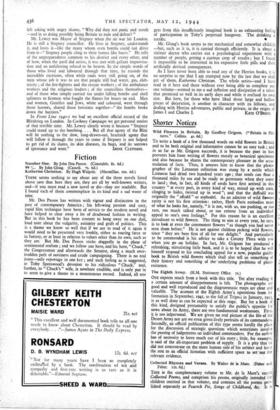Fiction
Number One. By John Dos Passos. (Constable. 8s. 6d.) 99 °,;,. By John Gloag. (Cassell. 7s. 6d.) Katherine Christian. By Hugh Walpole. (Macmillan. ios. 6d.)
THERE seems nothing to say about any of the three novels listed above save that here they are, they are all by well-known writers, and—if you must read a new novel or die—they are readable. But I found each of them commonplace in its kind and a sad waste of time.
Mr. Dos Passos has written with vigour and distinction in the past of contemporary America ; his left-wing passion and easy, rapid film technique have been of service to the modern novel and have helped to clear away a lot of deadwood fashion in writing. But in this book he has been content to bang away on one dull, loud note about the vulgarity, asininity and graft of politics. This is a theme we know so well that if we are to read of it again it would need to be presented very freshly, either as roaring farce or in fantasy, or at least in relation to values other than its own, such as they are. But Mr. Dos Passos sticks doggedly in the plane of sentimental realism ; and we follow our hero, and his hero, "Chuck," the Congressman and afterwards the Senator, along a much over- trodden path of noisiness and crude campaigning. There is no real irony—only reportage in one key ; and such feeling as is suggested, in Toby Spotswood's devotion to his ridiculous " Chuck," and, further, to " Chuck's" wife, is nowhere credible, and is only put in to seem to give a theme to a monotonous record. Indeed, all one
gets from this insufficiently imagined book is an exhausting feeling of participation in Toby's perpetual hangover. The drinking is terrific. •
Mr. Gloag's book seems to me mechanical and somewhat childish —but, such as it is, it is carried through efficiently. It is about a sinister doctor who carries out a psychological experiment with a number of people, getting a curious crop of results ; but I found it impossible to be interested in his expensive little pills and their artificially devised consequences.
As I have never been able to read any of the Herries books, it is no surprise to me that I am stumped now by the last that we shall get of them, Katherine Christian. The whole series—and I have read in it here and there without ever being able to complete any one volume—seemed to me a sad inflation and dissipation of a talent that promised so well in its early days and while it realised its own size. But here, for those who have liked those large and hollow pieces of decoration, is another in character with its fellows, and dealing with Herries adventures, public and private, in the reigns of


























 Previous page
Previous page